 Corvallis, Oregon
Corvallis, Oregon
Thankful Thursday: tinywords
Because appreciation increases joy, it's Thankful Thursday.
What are you thankful for today? A person, a place, a thing? A story, a song, a poem? Please join me for Thankful Thursday. I'd love to hear what makes you smile. Share yourself — with a comment below, or with a posting on your blog (please link back to this page so we can share in your thankfulness).
I've found the more I appreciate, the more I see to appreciate. Joy expands and contracts in direct relation to our sense of gratitude. Tell me, what makes your world expand?
• • •
Today I am grateful for tinywords. With a clean design, tinywords is an elegantly simple online journal offering a daily dose of micropoetry. Each day a new short poem stands in distilled light. Words, when pared, shine.
"Poetry is language under compression," explains D.F. Tweney, founder/editor of tinywords, in an online interview. "And there's no more compressed form than the very short poem."
Sharpie Poems
Inspired by Austin Kleon's Newspaper Blackout Poems, and desperate for a creative jolt, I got out the Sharpie and made poems of elimination.
Have you tried Blackout Poems? They are fun, sometimes easy, and a great way to exercise the poetic muscle. Some poems struggle to make sense while others emerge unexpectedly meaningful. Either way, it's good fun — and better than hours on the couch dazed and glazed over Say Yes to the Dress.
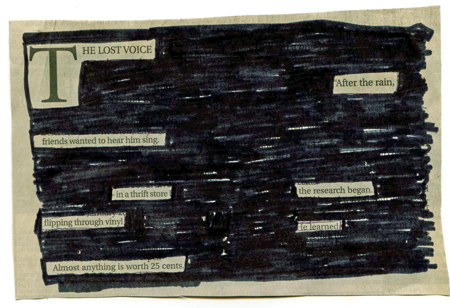
The Lost Voice
After the rain,
friends wanted to hear him sing
In a thrift store, the research began.
Flipping through vinyl, he learned
almost anything is worth 25 cents.
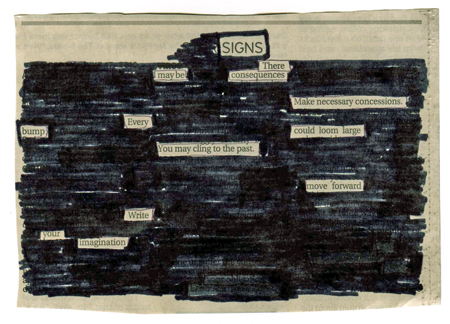
Signs
There may be consequences
Make necessary concessions
Every bump could loom large
You may cling to the past
Move forward
Write your imagination
Writing A Story

Thankful Thursday: Summer Skirts

It's Thankful Thursday. Let the gratitude begin!
Is there anything better than the summer skirt?
Cotton, linen, silk
A-line, pencil, fitted, flared
Dressed up or knocked down
My love of the flutter-in-the-breeze summer skirt is only matched by my love of the summer sandal, which is only trumped by my favorite place to find these fashionable goods: the resale shop!
I'm not new to the resale revolution. My thrifting affinity started in high school (trench coats and men's blazers from Value Village, circa 1980s) and later evolved into vintage sweaters and dresses (from Denver's Barbareeba, circa late 1990s). While my fashion tastes have changed, my frugal ways remain. And the summer skirt — a symbol of carefree, sunshiney days — is always my favorite find.
In the last few weeks, I have scored unusually great goods at:
Second Glance, and its little sister store, the Annex, in Corvallis, Oregon
A consignment shop that 'revolves' clothes (rather than resells, a distinction I appreciate for its creative semantics). Hip, funky and fun, Second Glance is geared to the female adult, while the Annex has a steady college-age following.
Goodwill on 10th, in Portland, Oregon
Described by one shopper as a thrift store for "better heeled bargain hunters." Store managers carefully 'edit' donations and sell gently-used clothes with mid to high-end labels.
Thank you, resale shops, for being a low-cost purveyor of (affordable & fashionable) summer joy!
Writer Revealed: Susan Rich
Lately, I am capable of small things.
Peeling an orange.
Drawing a bath.
Throwing the cat's tinsel balls.
Believe me, this is not unhappiness.
Only one question—
why this layering on of abeyance?
Though it is winter inside of me —
there is also spring and fall.
Yellow tulips in need of planting
root in a basket by the door.
— an excerpt from Letter to the End of the Year
from The Alchemist's Kitchen by Susan Rich
An Interview with Susan Rich

In recommending your latest collection of poems, poet Jane Hirshfield praises your “kaleidoscopic curiosity” and your “powerfully kinesthetic language.” What influences or inspirations led you to poetry, and to your “powerful and compassionate” poems?
As an undergraduate, I was lucky enough to study with Madeline DeFrees and she introduced me to the work of Carolyn Forche. The Country Between Us was a pivotal book for me. Here was a woman, a young woman, who had traveled outside of the United States to El Salvador and who had come back to write poems concerning things that mattered — life in extremity. I had just returned from two years living outside the United States as well and wanted to believe that I, too, had permission to write about my life.
The Alchemist’s Kitchen is a wonderful blend of the everyday and the ethereal, and includes many poems inspired by paintings and photographs. What is your favorite poem in this collection? Why?
Oh dear. My favorite? Isn’t that a bit like asking a parent to choose their favorite child? I can’t do it. But what I can do is choose several favorites with the caveat that these “favorite” categories are fluid. If you were to ask me tomorrow, the choices I’d make would be different. Given that I am in the throws of planning a reading for tomorrow night, I can focus on poems that are fun to read — that are meant for the air. One of these is “Mr. Myra Wiggins Recalls Their Arrangement.” It’s a persona poem in the voice of Myra Wiggins’ husband. I had never written from a man’s point of view before and I found it oddly liberating. “The 4 O’ Clock News @ House of Sky” is a poem that I like to read aloud. This poem is dedicated to my very dear friend, the poet Kelli Russell Agodon. I wrote it while in Spain but it concerns our friendship and goes off in some strange directions. The most personal poem in the book might be “The Never Born Becomes of Age” and what I like about it is that I did not want to write it, yet it persisted. I like to write poems that I don’t want to write.
Can you tell us about the title of your book? Where it came from? What it means to you?
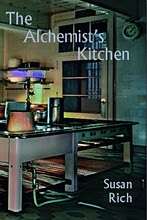 The title of this collection came to me far more easily than the titles of either of my past books. I was re-reading Denise Levertov’s New and Selected Essays – many of which were written I believe — during her time in Seattle. In her essay Biography and the Poet (1992), Levertov takes up the question of literary biography of poets (and by extension, she expands, all biographies) as to whether we need to know about the drugs and dalliances of the life or if they are “the chaff which the the imagination has discarded.” For the most part, she rallies against being too inquisitive regarding the facts of the poets life. But the essay is balanced with praise for certain biographies such as Walter Jackson Bates Life of Keats, where the biography is in service to the poems or to essays or journal pages some poets had published. Sometimes, Levertov says, understanding the life of the poet “one is grateful for a glimpse into the alchemist’s kitchen.” I immediately felt myself drawn to the phrase.
The title of this collection came to me far more easily than the titles of either of my past books. I was re-reading Denise Levertov’s New and Selected Essays – many of which were written I believe — during her time in Seattle. In her essay Biography and the Poet (1992), Levertov takes up the question of literary biography of poets (and by extension, she expands, all biographies) as to whether we need to know about the drugs and dalliances of the life or if they are “the chaff which the the imagination has discarded.” For the most part, she rallies against being too inquisitive regarding the facts of the poets life. But the essay is balanced with praise for certain biographies such as Walter Jackson Bates Life of Keats, where the biography is in service to the poems or to essays or journal pages some poets had published. Sometimes, Levertov says, understanding the life of the poet “one is grateful for a glimpse into the alchemist’s kitchen.” I immediately felt myself drawn to the phrase.
I’ve re-interpreted Levertov’s original sense of looking at a poet’s memoir or biography being the alchemist’s kitchen to the poems themselves being the material of alchemy — the ordinary objects turned to gold. In researching more on the nature of alchemist– in its original meaning – I learned that Alchemy has a double origin in Greek philosophy and Egyptian texts. That the origins of the word itself is thought to be Arabic. But what fascinated me the most was that the alchemists were not merely interested in turning base metals into gold but that there was a spiritual discipline and that the transformation of metals was secondary to the wisdom that the alchemist would himself attain through their work. One of my favorite quotes by the poet Stanley Kunitz goes like this: “the first task of the poet is to create the person who will write the poems.” So to answer your question, I’ve used the term “alchemist’s kitchen” as a metaphor for the process of writing poems. That said, I also am a great lover of food — growing it, preparing it, bringing friends together to enjoy it.
You teach community college students. How do you balance your work teaching and encouraging students with your own writing and book promotion?
Your question implies that there is balance in my life. Hmm. Most of my own writing happens during the summer, over winter break and on sabbaticals. I think that’s why I’ve embraced the technology of the blog. I began the blog this past November as an experiment. I’ve been surprised at how much I’ve enjoyed the blogosphere — and I suspect it is because I can maintain a small handhold on my creative life even during term time. My teaching life is also creative, but in a different way.
Your book was recently published and you’ve embarked on a tour that includes both the traditional (bookstore readings, print interviews, etc) and non-traditional (in-home ‘salon’ readings, virtual readings and interactive readings, etc). Where is your ideal reading?
My ideal reading? I would like to read in a really wonderful restaurant. A place that uses as much locally grown food as possible and that’s housed in an old building. Maybe the building is made of stone and was once a dance hall or flour mill. After a scrumptious meal and perhaps a bit of live music — while the guests tapped the tops of their crème brulee, I would read my poems. I would read food poems about “glazed florentines and praline hearts” or “tiramisu and lemon tarts.” I’ve read my poems in a variety of venues, but I’m still waiting to be asked to read in a restaurant. I would like that.
To learn more about Susan Rich and her poetry, go here.
Thankful Thursday: Bok Choy
 Why wait 'til November?
Why wait 'til November?
Because gratitude begets appreciation, which creates joy, I'm making every Thursday a day of thanks. Let the gratitude begin!
On this Thursday, I give thanks for:
Bok Choy and Beets
I've always wondered what to do with these dark, colorful jewels of nature. Thanks to an abundance of veggies from Gathering Together Farm, I am sauteing up a storm of fresh food. A weekly share of farm-fresh goods saves me from my usual routine of taste-less, nutrition-less plastic bag salad.
June Gloom
I'm not really thankful for this oppressive Juneary weather we're having on the Oregon Coast but the static gray skies have coaxed me to write (too many) pages bemoaning our summer-less weather. While the poems may be dreadful, the act of writing is good exercise. Surely some 'good' stuff will emerge from this muck.
This Emotional Life
This fascinating PBS series explores our brains and how we handle love, fear, attachment and more. And I am thankful to Netflix, which continually connects me to fresh films and ideas.
The Ten Year Nap
How did I miss this novel when it was published in 2008? I fell upon the book last week and can't put it down. I read it in the bathtub, while waiting for my car's oil change, and late into the night. The Ten Year Nap, by Meg Wolitzer, is a rich, observant and layered examination of four women as they struggle through mid-life marriage, family and choices.
Please join me in Thankful Thursday. For what do you give thanks today?
And the winner is . . .
. . . Nancy Carol Moody
 Congratulations Nancy, you are the lucky recipient of Pacific by Ce Rosenow.
Congratulations Nancy, you are the lucky recipient of Pacific by Ce Rosenow.
Many thanks to all the readers and writers and poet appreciators who entered the drawing (via email and blog). Your participation is much appreciated.
Pacific — my newest favorite book of poems — can be purchased at Mountains & River Press.
I'm an old writer
"Older writers use too many dashes (both en and em), structure a piece in longer paragraphs, put “the end” or a dingbat after the last line, submit work that has been meticulously proofed, sometimes set up their email cover notes to look like traditional business letters, and are often extremely well-mannered."
Guilty. I do it all. And, until now, I thought these were marks of a professional. Turns out, it can "backfire with a much younger editor who is used to abbreviated quick-fire notes, interprets politesse as unnecessary blather, and sees a long missive as nothing more than a time suck."
Writer Lisa Romeo offers some (painful) insight on her blog, Lisa Romeo Writes.
Read it and let me know: Are you weeping or cheering?
A for accomplishment
Maybe every graduation is tinted with transformation.
From preschool to college we are eager to mark transitions. Mothers cry with pride — My baby! — and with incredulity — All grown!
I’ve been to a handful of graduation ceremonies and I’ve purchased dozens of graduation gifts. Sometimes I search out the perfect token but too often it’s been an obligatory offering. I’ve felt some emotion, sure, but from a distance. A sort of good-for-you lukewarm applause.
I never felt the awe of accomplishment. Until the other night.
There were no gowns. No gifts. No long-winded speeches.
Just four adults waving certificates and sharing a sheet cake.
Just four graduates — circled by two parents, two children, a boyfriend, and the volunteers who helped them achieve their GEDs.
 Seashore Family Literacy's first GED graduates“This is the first goal I accomplished in my life,” said the 40-year-old mother of two.
Seashore Family Literacy's first GED graduates“This is the first goal I accomplished in my life,” said the 40-year-old mother of two.
“I feel amazing!” said the 19-year-old who had dropped out of high school, refocused, and now held a diploma.
“I wanted to do better for my kids,” said the 43-year-old single mother, choking back tears.” I didn’t have time. I didn’t have money. There were so many obstacles. I waited a long time. If it wasn’t for this program, I could have never have done this.”
There was no theme music. No celebratory toasts. Just an infectious joy that made everyone — from the tutors to the new students just starting to study — feel a jolt of hope.
For an hour, in a small room of an old school, we were collectively lifted in a transformation. As if, at the same time, and with fierce pride, we each held a new truth: If Angie, Ashley, Heather and Kristi can soar over life’s many obstacles, maybe I can, too!
Fast Five with Ce Rosenow
gratitude
a bit of sea foam
in my open hands
 Because a few direct questions can lead to endless insight, I'm happy to present Fast Five — short interviews with my favorite writers. Sure, life is short but who doesn't have time for five questions — and a chance to win a great book? (To win, simply post your name and contact info in the comments section below. Your name will be entered in a random drawing to win Pacific by Ce Rosenow).
Because a few direct questions can lead to endless insight, I'm happy to present Fast Five — short interviews with my favorite writers. Sure, life is short but who doesn't have time for five questions — and a chance to win a great book? (To win, simply post your name and contact info in the comments section below. Your name will be entered in a random drawing to win Pacific by Ce Rosenow).
 Our first Fast Five is with Ce Rosenow, president of the Haiku Society of America and the publisher of Mountains and Rivers Press. She lives in Eugene, Oregon where she teaches writing and literature at Lane Community College and the University of Oregon. Pacific is her fifth poetry collection.
Our first Fast Five is with Ce Rosenow, president of the Haiku Society of America and the publisher of Mountains and Rivers Press. She lives in Eugene, Oregon where she teaches writing and literature at Lane Community College and the University of Oregon. Pacific is her fifth poetry collection.
In the introduction to Pacific, Michael Dylan Welch says, “The greatness of the ocean is at once calming and frightening, repelling and attractive, and these poems dwell in such tensions.” What influences or inspirations led you to poetry?
I think the primary reason I was drawn to poetry was a combined love of language and realization that some kinds of knowledge and understanding are beyond the scope of language. Poetry not only accommodates those two responses to language but embraces them.
Why haiku? What is it about this form that interests you?
Reading and writing haiku has the potential to become a life philosophy or a life practice. Haiku focus on a single moment and draw our attention to very specific happenings within that moment. So much of my work outside of haiku involves analysis. Recognizing haiku moments and writing haiku to convey them offer a balance to my analytical work by encouraging me to stay present and attentive to the individual moments I experience.
so many stars
so much I don't know —
winter night
When we met at the Poets’ Concord in Newport, Oregon, we briefly discussed the haiku. Modern haiku is not constrained to the traditional 5-7-5 syllable format. Would you share more about what makes a poem a haiku?
There are so many different approaches to writing haiku in English. Personally, I am drawn to haiku that use images of two simultaneously-occurring events and suggest the interconnectedness of things. At least one of the images is of nature. The internal comparison, or the relationship between the two events, is also central for me in haiku. The poems can either follow a fixed syllable count or, more commonly, no syllable count at all, and I appreciate haiku that effectively utilize a pivot line so that there is some sense of surprise at the end of the poem. There are several books that explain in varying degrees of detail the different approaches to haiku, but I’ll just mention two: The Haiku Handbook by William J. Higginson (now available in the 20th anniversary edition) and Haiku: A Poet’s Guide by Lee Gurga.
What poets and writers would you like to emulate?
I’m afraid I could produce an endless list of writers whose work includes things I admire. I do know that I am particularly drawn to writers who combine their interests in writing, editing, and translating, as well as in publishing the work of other poets. Cid Corman is a wonderful example of someone who dedicated his life to poetry. He wrote poems on a daily basis and engaged for decades in editing, translating, and publishing, as well.
arguing
on the windy beach . . .
sand in my teeth
You are an accomplished poet, teacher and publisher, and have taken part in numerous readings and interviews. What question hasn’t been asked that you’d like to answer?
What a great question! My answer relates to my previous comments about writers I would like to emulate. I think it would be interesting to be asked about the relationship between writing, researching, teaching, editing, translating, and publishing. All of these things are in conversation with one another. They allow me to come at ideas and the expression of ideas through language from so many different perspectives, and those perspectives inform the ways in which I make poems.

To win Pacific, poems by Ce Rosenow, add your name and contact info in the comments section below. Feeling shy? Email me!: dcm@drewmyron.com
Your name will be entered in a random drawing. The winner will be announced on Wednesday, June 23rd.
And the winner is . . . .
Nancy Carol Moody
Congratulations Nancy, you are the lucky recipient of Pacific by Ce Rosenow.
Many thanks to all the readers and writers and poet appreciators who entered the drawing (via email and blog). Your participation is much appreciated.
Pacific — my newest favorite poetry book — can be purchased at Mountains & River Press.
Life is like a book

Life, in so many ways, is like a good book.
You are happy when you get to read it.
But so very sad when you put it down.
- Natosha, age 10
Thankful Thursday

"There’s always something to be thankful for," says writer Leah Dieterich, who expresses her daily gratitude at thxthxthx.com.
Like Leah, I love the thank you note.
At a young age, my mother taught me the value of expressing gratitude.
As an adult, the thank you notes expanded beyond appreciation for birthday or holiday gifts to include gratitude for a slice of sunshine, a good book, or a smile from a stranger.
I often send thank you notes as letters to those I love: As the sky hangs heavy, I'm thinking of you, how you stand bright against this gray . .
And just as often, I write to myself — in appreciation for all the people, places and feelings that make life deeper, kinder, brighter.
In the writing groups we compose Feel Good Pages. I think of it as an expansion of thankfulness, a chronicle of the parts of life that make us happy and grateful. Students sometimes groan a bit. They've been in school all day. They are tired, depleted and want to whine. And frankly, I do, too. I'm no Pollyanna. But the state of malaise is exactly why we need our Feel Good Pages — to elevate us from daily wear and tear, to remind us of our better selves.
So we write. And like a weak sun made bright with the parting of clouds, the mood in the room shifts and lifts. The more we recall and appreciate the feel good-ness of life, the more we really do feel good. After 10 to 15 minutes of writing, the children are bursting to share their pages. We are all smiles and giggles and light.
And really, isn't that the beauty of gratitude?
Book Launch Party — Tonight!
The truth? I wasn’t crazy about kids.
Teenagers were daunting. Youngsters were alien. And I had no maternal instinct. But that was before I became immersed and attached to the children in the Seashore Family Literacy writing programs. Now I can’t stop thinking about the stories taking shape, the poems that sing, and the earnest efforts of youngsters with hearts wide and willing.
 In each of the writing groups we talk about the importance of being wide awake to the world, and to the power of words — to soothe and heal, to hearten and encourage, to open doors and close wounds. Combining the physical act of writing with the mental and emotional experience of imagination can produce profound results. At Seashore, writing is not just a skill but a powerful vehicle for change.
In each of the writing groups we talk about the importance of being wide awake to the world, and to the power of words — to soothe and heal, to hearten and encourage, to open doors and close wounds. Combining the physical act of writing with the mental and emotional experience of imagination can produce profound results. At Seashore, writing is not just a skill but a powerful vehicle for change.
I’ve been a part of Seashore Family Literacy for nearly six years and I’ve seen change, both in the students and myself. Within this brood of spirited youngsters, plucky tweens, sullen teens and loving volunteers, I have found my place — along with an unexpected tenderness for our young writers.
— Drew Myron
from the Introduction to Find Your Place: Poetry & Prose from Seashore Family Literacy, Volume 4
Tonight is the Book Launch Party for Find Your Place, the annual anthology from Seashore Family Literacy. Students will share their words and sign books. Please join the celebration and help us encourage young writers!
Can't make it to the party? You can still purchase books. Only $12 — and all proceeds benefit the Seashore Writing Programs. You can buy now, or send a check to Seashore Family Literacy, PO Box 266, Waldport Oregon 97394. Thanks for your support!
Although
Although the wind
blows terribly here,
the moonlight also leaks
between the roof planks
of this ruined house.
Finding my place, again and again
Sometimes you just want to write because it allows you to talk about it. You are not judged.
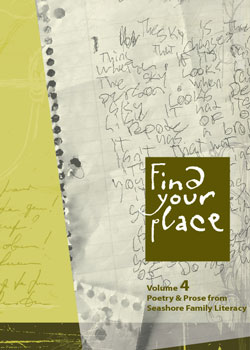 The annual anthology from Seashore Family Literacy is fresh from the press. This year the book features work from all the Seashore writers — 40 students/volunteers/mentors, from ages 9 to 75.
The annual anthology from Seashore Family Literacy is fresh from the press. This year the book features work from all the Seashore writers — 40 students/volunteers/mentors, from ages 9 to 75.
The fourth volume of Find Your Place reflects our growing programs. We started with a teen writing group, and in the last few years have expanded to include grade school and middle school writing groups, along with summer writing camps. We recently added a writing group for adults, too.
I get a bit tender at this time of year, a mixture of exhaustion and achievement. Is this what parents feel? A bittersweet blend of "Thank God this year is over!" and "My God, they are growing up fast!"
Rather than jubilant, I feel a bit wrung-out. Rather than accomplished, I'm writing a mental list of all the things I should have done, shared, been. I fear I'm falling short of giving students what they need.
Last night I pried for feedback. Why do you come to writers group? I asked the teens and volunteers. What do you like best? What needs work? In a haze of end-of-year fatigue, the unspoken question was Does this matter?
This morning I read the student comments, and felt the gentle tug of Yes.
Writing is about finding who you are, about getting the words on paper before your brain bursts from an overload of stories.This is an escape place for me. Writing is like therapy on paper. I have learned a lot. It feels amazing being in a book!
You are a winner (or could be)
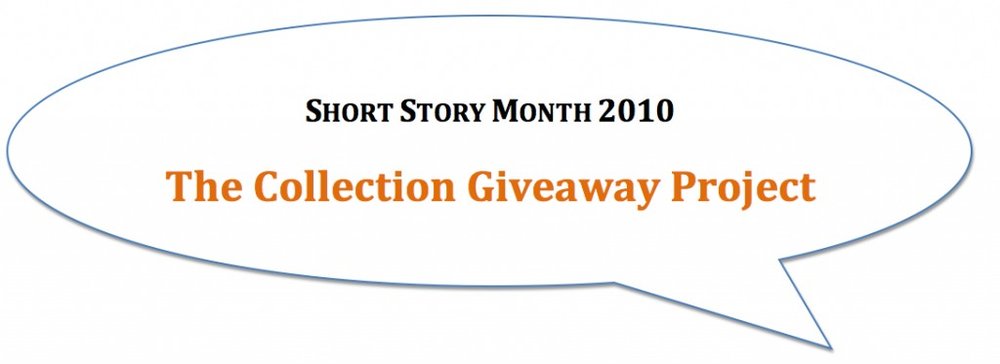
Speaking of luck (and we were), May is Short Story Month.
Fictions Writers Review is hosting the 2010 Short Story Collection Giveaway Project — meaning you could win free books.
You've gotta act fast -- the giveaway ends this week. Go here now!
Luck runs in
April brought a bounty of good books and good luck my way. May has been unusually charmed, too.
Because my good fortune involves absolutely no skill, I'm not boasting. I wrote my name and hit 'send.' I like my wins without fret, frazzle or fear.
 In honor of National Poetry Month, several blogs hosted Poetry Book Giveaways (thanks to mastermind & poet Kelli Agodon). I was happy to give away books, and even happier to win one.
In honor of National Poetry Month, several blogs hosted Poetry Book Giveaways (thanks to mastermind & poet Kelli Agodon). I was happy to give away books, and even happier to win one.
I won Subject to Change by Matthew Thorburn. He writes in a wonderfully natural voice, while displaying a mind of complex and drifting associations. Thorburn crafts a solid collection of what one writer called post-postmodern poems. Line after line rings with insight and a knowing sort of humor:
. . . What is it with me and this small stuff,
anyway? I staple in quotes anything
you say, so it will stay. "What about those
for-instances?" I count them off
on my fingers. For instance, "Sometimes
things fall into place just so you can hear them
click." For instance, when I say "you"
I mean you. For instance, the dark
taste of fennel on the wet
little heart of your tongue. . .
from Friends Who are Married and Expecting More Babies
 But wait, wait, that's not all! This week I won another blog-based drawing (really, really, I never win anything — until this last month). Dawn at She is Too Fond Of Books gave away several copies of Austin Kleon’s Newspaper Blackout. I’m a big fan of Kleon’s work and can’t wait to read more of his unique scratch-out-words poetry.
But wait, wait, that's not all! This week I won another blog-based drawing (really, really, I never win anything — until this last month). Dawn at She is Too Fond Of Books gave away several copies of Austin Kleon’s Newspaper Blackout. I’m a big fan of Kleon’s work and can’t wait to read more of his unique scratch-out-words poetry.
(Dawn, by the way, is a generous blog hostess, offering numerous book giveways. You can’t win if you don’t enter.)
Is there anything better than unexpected books? I'm feeling grateful and well fed. Thank you book writers, lovers & givers. Your kindness gives and gives.
sunday
 Yachats, Oregon
Yachats, Oregon
sunday
the sign said
sit a spell
(so i did)
the sun broke
bells chimed
small birds sang
through a breeze
this is what
it means to
breathe
Book as Gift
Birthday. Mother's Day. Graduation.
There's nothing better than giving, or receiving, a book. Lately I've been swimming (gratefully) in books. May I share a few of my favorites?
 A book I bought for myself and want to give to everyone I know:
A book I bought for myself and want to give to everyone I know:
A beautiful restraint shines in Ghostbread, by Sonja Livingston. Written in 122 short chapters, Livingston tells the true story of growing up poor, hungry for food and love. Devoid of sentimentality, Ghostbread delivers a piercing combination of vivid detail and emotional control. In her preface, Livingston prepares us for the truth:
As a girl I never talked about how I grew up. It was complicated . . . Mostly I was certain that I was alone in a way that no one would understand. . .
I began to write. Of seven children who followed a mother as she flew around western New York live a misguided bird. How they flew and flew until they were sick from all the flying then landed flat and broken in the muggy slums of Rochester, New York. I wrote of living in apartments and tents and motel rooms. . . About sleeping in shacks and other people's beds . . .
A testament to survival, this memoir stands strong (and won the Award For Creative Nonfiction from the Association of Writers and Writing Programs).
I want to give Ghostbread to everyone I know, to those who recognize the pain and shame poverty can bring. And conversely, for those who believe poverty lives in the next town over, on another street, or church, or school, for those who can't see the struggling youngsters in their own backyard.
As Livingston writes at the book's end:
"How did you make it through?" people want to know. And I am not being humble or coy when I shake my head and can find no words.
I am not sure. . .
I celebrate and cry for those who still live in poverty's clutches: beautiful nieces, good-hearted nephews, hardworking siblings. I see with agonizing clarity from where I stand, and though I'd love to point them in new directions, there is not rope strong enough to pull someone from one life to another. And perhaps it is arrogance to try. Ideals and opportunities and social theorizing are just fine, but if you must understand only one thing, it is this: a warm hand and words whispered into the ear are what we want. Paths that can be seen and followed and walked upon are what we most need."
from Ghostbread
 An unexpected gift:
An unexpected gift:
Rick Campbell, of Anhinga Press, is a good friend to Seashore Family Literacy, where I lead writing groups. He sends us boxes of books and we dig in with Christmas-morning joy. A recent shipment contained some goodies, including Me, Them, Us, a novella by Meagan Ciesla. The story — a tight, sharp slice of poverty, choices and getting through — won first place in the Iron Horse Literary Review 2009 Novella Competition.
What I like about this work of fiction is — as with Ghostbread — its restraint. Characters are trying, ugly and mean. But instead of being written in broad strokes of bad, Ciesla writes with nuance to reveal effort, achievement and the gaps in between.
When it's been hard getting to know people your whole life, meeting someone who's easy to be with feels off. You start to wonder where the lies live, where the hurt is hidden. You hold your breath and wait for its end. Take your good luck as a warning sign that this can't last for long, that something's going to go terribly wrong.
from Me, Them, Us
How about you?
What books are you giving? or getting? Please share!

